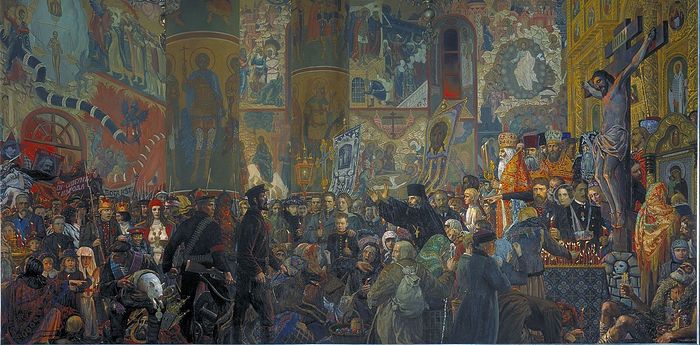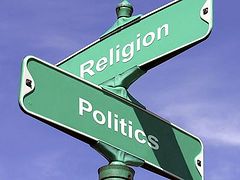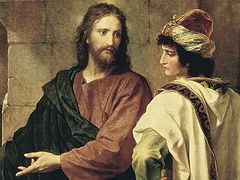The English philosopher, Thomas Hobbes, described the world as composed of autonomous, competing self-interests. We are at war with one another, a reality, he said, that can only be controlled through external force. The state serves as the enforcer of a negotiated peace agreement, a social contract, in which we legitimize its use of force in order not to kill one another. Hobbes himself preferred a strong monarchy. Certain times in our culture feel more “Hobbesian” than others.
In a conversation with a young friend, I was told that “politics is the only way to get anything done.” This is not true. Politics (the use of civil power) is a means to gain the upper hand in a Hobbesian struggle. It is war, fought by other means. It is for that reason that politics is a questionable activity for Christians. The victories achieved are often brief, and, depending on the opposition, only maintained by the continued use of force.
It is profoundly the case that civil (or military) force are not the tools of the Kingdom of God. It is among the many reasons why the Kingdom of God is not, and never can be a human project. The Kingdom of God is not a process or a progressive movement within history. The Kingdom exists utterly complete and finished. Indeed, this is the very point of the Kingdom. It is the will of God in its fulfillment, the true righteousness where everything has been (yes, has been) set right.
The Kingdom of God is the End of all things, the fullness of the age to come. What is little understood is that its “coming” should be thought of as its “touching” or “penetrating” our present age. And where that penetration occurs, its reality is made manifest. In Jesus Christ’s earthly ministry, the Kingdom of God was personally present. Everything that surrounded Him, His miracles, His teachings, were manifestations of the Kingdom of God.
In the Eucharist, Orthodox Christians hear this:
It was You Who brought us from non-existence into being, and when we had fallen away You raised us up again, and did not cease to do all things until You had brought us up to heaven, and had endowed us with Your kingdom which is to come. 1
What Christ brought was not a set of ideas to be shared in the Hobbesian conflicts of this world. What He brought was the Kingdom itself and the means for our entrance into that Kingdom and for its life to be manifest in us. It has become commonplace for modern Christians to espouse some ideas based on Christian “moral principles” and to make them the guiding light for political projects, sometimes saying that they are “building up the Kingdom in this world” (or words to that effect).
If they could build the resurrection of the dead, then their words would have meaning. But they cannot. There is nothing in the character of the Kingdom that can be achieved by human efforts. Nothing.
It is this transcendent, eschatological life of the Kingdom into which we are Baptized, and it is its very life that is birthed in us. That new life is nothing less than the life of Jesus Himself. Learning to live from within that new birth of life is the proper nature and character of the Christian life. Christ did not come to reform the world: He came and brought a new world with Him.
When the Christian life is reduced to moral and political principles, it simply becomes one more warring voice within Hobbes’ nightmarish description of life. This is true regardless of how noble our intentions might be. This is also deeply frustrating for us. The Christian life as moral and political principle does not require anything more than new opinions. It masquerades as renewal and change when it is nothing more than the same war fought by unbelievers.
St. Seraphim of Sarov famously said, “Acquire the Spirit of Peace and a thousand souls around you will be saved.” He could have added that without that acquisition we cannot do anything of note for even a single soul.
The Acquisition of the Kingdom
Christ says to Nicodemus, “You must be born again (or born from above).” This is not a reference to an emotional experience of conversion. It is a reference to the Kingdom of God birthed in us through Holy Baptism.
Nicodemus said to Him, “How can a man be born when he is old? Can he enter a second time into his mother’s womb and be born?” Jesus answered, “Most assuredly, I say to you, unless one is born of water and the Spirit, he cannot enter the kingdom of God. That which is born of the flesh is flesh, and that which is born of the Spirit is spirit.” (Jn. 3:4-6)
The Christian life is that which is “born of the Spirit.” The strange paradox that marks the commandments of Christ is a key to this manner of life.
- Forgive your enemies
- Give without expecting in return
- Lose your life rather than save it
- Resist not evil
None of these actions make sense in a Hobbesian world. Instead, we discuss the commandments as though they were ideals too difficult to achieve, but very noble in their sentiment. Hobbesian Christianity has its own commandments:
- Manage your enemies
- Give to those who deserve it
- Be careful with your life, it’s the only one you have
- Resist evil, and where necessary, kill it
It is in the life of obedience to Christ’s commandments, in the fullness of their paradox, that we are thrown into a radical dependence on the Spirit of Peace, the Kingdom of God birthed within us.
Jesus answered and said to him, “If anyone loves Me, he will keep My word; and My Father will love him, and We will come to him and make Our home with him.” (Jn. 14:23)
Another way to describe this life is continual repentance. To repent does not mean to feel bad and ask for a moral reprieve, a relief from guilt. Repentance is a true change of mind/heart. That change is the rejection of life in a Hobbesian mode and the acceptance of life rooted and grounded in the Kingdom of God. That is the meaning of Christ’s words, “Repent! For the Kingdom of Heaven is at hand!”
St. Paul has this in mind when he writes:
I beseech you therefore, brethren, by the mercies of God, that you present your bodies a living sacrifice, holy, acceptable to God, which is your reasonable service. And do not be conformed to this world, but be transformed by the renewing of your mind, that you may prove what is that good and acceptable and perfect will of God. (Rom 12:1-2)
In a time when the world is entering ever deeper into its madness, it is difficult for Christians not to be drawn in. The voices calling us to the barricades (on both the Left and the Right) easily describe their cause in Christian terms. They fail to understand the fundamental nature of their own madness. Alexander Solzhenitsyn, when asked about how the tragedies of the Soviet Union occurred answered simply, “We have forgotten God.” When he was exiled to the West, he observed quietly for several years and then told us, “You have forgotten God.”
This is not a slogan for anyone’s political agenda. It is nothing other than the proclamation of the Kingdom of God. It is inaugurated (already) in the hearts and lives of faithful believers, manifest in the lives of the saints. Thousands of souls around us stand weary and hungry for salvation. Acquire the Spirit of Peace.





We are called to be in the world yet not of the world. Yet the world pushed by satan never ceases to try to gain entry into and corrupt everyone and every thing, especially the Church of Jesus Christ!!
We have to stay close to the Shepherd and stay in fellowship with Him and His saints.
As far as the outside world we are responsible to be salt and light to it, and to a certain extent that may require us to be involved in it in some capacity, but in so doing we must always be extremely careful.
Our ultimate responsibility is to God and to His Kingdom. Amen!!